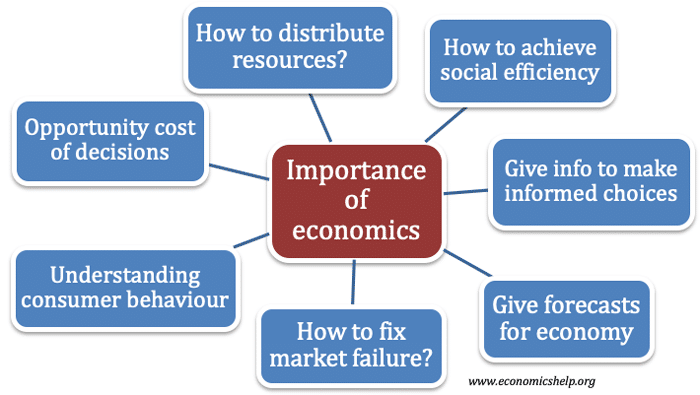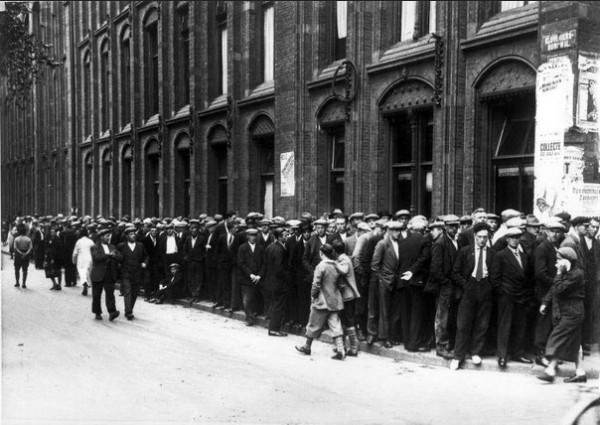Readers Question: What is the importance of economics?
Economics is concerned with the optimal distribution of resources in society. The subject involves
- Understanding what happens in markets and the macroeconomy.
- Examining statistics about the state of the economy and explaining their significance
- Understanding different policy options and evaluating their likely outcomes.
Examples of the importance of economics

- Dealing with a shortage of raw materials. Economics provides a mechanism for looking at possible consequences as we run short of raw materials such as gas and oil. See also: Effects of a world without oil.
- How to distribute resources in society. To what extent should we redistribute income in society? Is inequality necessary to create economic incentives or does inequality create unnecessary economic and social problems?
- To what extent should the government intervene in the economy? A critical divide in economics is the extent to which the government should intervene in the economy. Free market economists, like Hayek and Friedman, argue for limited government intervention and free markets. Other economists, like Stiglitz or Krugman, argue government intervention can overcome inequality and the underprovision of public goods. For example – should the government provide health care free at the point of use or is it more efficient to encourage private health care? See also: To what extent should the government intervene in the economy?
- The principle of opportunity cost. Politicians win elections by promising more spending and cutting taxes. This is because lower taxes and more spending is what voters want to hear. However, an economist will be aware that everything has an opportunity cost. Spend more on subsidising free university education, and it means higher taxes and lower spending elsewhere. Giving students £4,000 a year to spend at university may be a noble ideal. But, is it the best use of public money? Are there better uses of money, such as spending on primary education? See: Opportunity Cost
- Social efficiency. The free market leads to countless examples of market failure. I feel one of the best uses of economics is to provide solutions to overcoming market failure. For example, driving into the centre of town creates negative externalities such as pollution and congestion. There is overconsumption. An economist can suggest a tax on driving into towns to internalise the externality. Of course, new taxes are not popular, but, it might provide a better solution for society. You may not want to pay £10 a week to drive into a city centre. But, if it saved you two hours of sitting in a jam, then maybe you would be much happier to pay it.
- Knowledge and understanding. One of the principal jobs for economists is to understand what is happening in the economy and investigate reasons for poverty, unemployment and low economic growth. For example, in a political debate such as – Should, the UK leave the EU? There are many emotional arguments made about immigration. Economic studies can try and evaluate the costs and benefits of free movement of labour. Economic studies can try to examine the economic effects of immigration. This can help people make a decision about political issues.
- Forecasts. Economic forecasts are more difficult than understanding the current situation. However, although forecasts are not always reliable, they can help give decision-makers an idea of possible outcomes. For example, in 2003, the UK took a decision about whether to join the Euro. Many economists suggested the UK could struggle with a common monetary policy. The Euro was not an optimal currency area with the UK in. This analysis was a factor in UK government deciding not to join. In retrospect, the analysis under-estimated the costs of the Euro. But, if it had been taken on purely political grounds, the UK may have joined.

When the economy goes wrong, millions can suffer. Here mass unemployment in the 1930s. - How to deal with an economic crisis. In the 1930s, the Wall Street Crash precipitated a significant rise in unemployment. There was a debate on how to respond. Many western governments increased taxes, tariffs and benefits. This response caused John M. Keynes to develop a new branch of economics – focused on dealing with a persistent recession.
- Evaluation. Economics is not a definitive science like Maths. Because of many unknown variables, it is impossible to be definitive about outcomes, but a good economist will be aware the result depends on different variables, and there are different potential outcomes. This should help avoid an overly ideological approach. For example, a government may have the philosophy ‘free markets are always best’, but an economist would be aware of a more nuanced view that in some markets, like health care, transport, government intervention can overcome market failure and improve welfare. But, at the same time, it doesn’t mean state intervention is always best.
- Behavioural economics Why do people behave as they do? Can governments subtly nudge people into better behaviour, e.g. banning cigarette advertising? Are we subject to bias and irrational behaviour? For example, can we be sucked along by a bubble and lose a fortune on the stock market? Behavioural economics examines the reasons why we make decisions. See: Behavioural economics.
- Applying economics in everyday life. Modern economists have examined economic forces behind everyday social issues. For example, Gary Becker argued that most crime could be explained by economic costs and benefits. See: Applying economics in everyday life.
Limitations of Economics
Does economics place too much value on rationality, utility maximisation and profit maximisation? That is the work of behavioural economics who are more critical of the limitations of the traditional economic theory.
Does GDP measure living standards?
Related reading
- Economic growth and happiness
- A frivolous look at ten reasons to study economics
- Winners and losers from globalisation
- Economic instability
Last updated: 10th March 2020, Tejvan Pettinger, www.economicshelp.org, Oxford, UK

It reals helps
Ok
Yeah that’s right good job
I agree with you about opportunity cost of politicians…🤣🤣🤣
Economic is the social science to a group of social science to other subjects in the same group are religious studies and it really good to individuals needs 👍👍👍👍😊😊😊
Economics is the study of manage individuals, groups, and nations’ unlimited demand and wants with limited resources. The study of economics not only expands the skills required to understand multifaceted markets but also comes left with sturdy analytical and problem–solving skills and with additional business expertise necessary to be successful in the professional globe village even though Economics is useful for professionals in all industries even not only in business
Dear honourable sir I need economics support to establish an new business which can stand me an happy life with humanity and be upon to helping others to establish their life with an modernity in future
Yes health crisis is common problem in our life everyday,I have been trying personally to do an new plan that’s save people’s health riscks,for this people’s need to understand what is health? health mean a human body and minds protect from disease,what is disseas? disease is one kinds of effect in our health,by various virus,and disseas,how we protect us,we protect us from disseas by our understanding what feeling in our body health,and what it’s harm,what kinds of disseas?then we personally try to stop this disseas,then a man can safe his/her health.
I have small amount of money with me but I fail to identify business to start please I need some help coz I don’t know what to do next since there is risks and uncertainty in business
start selling food if you can cook its pretty low risk if you get into events
Very good to to analyze this importance of economic